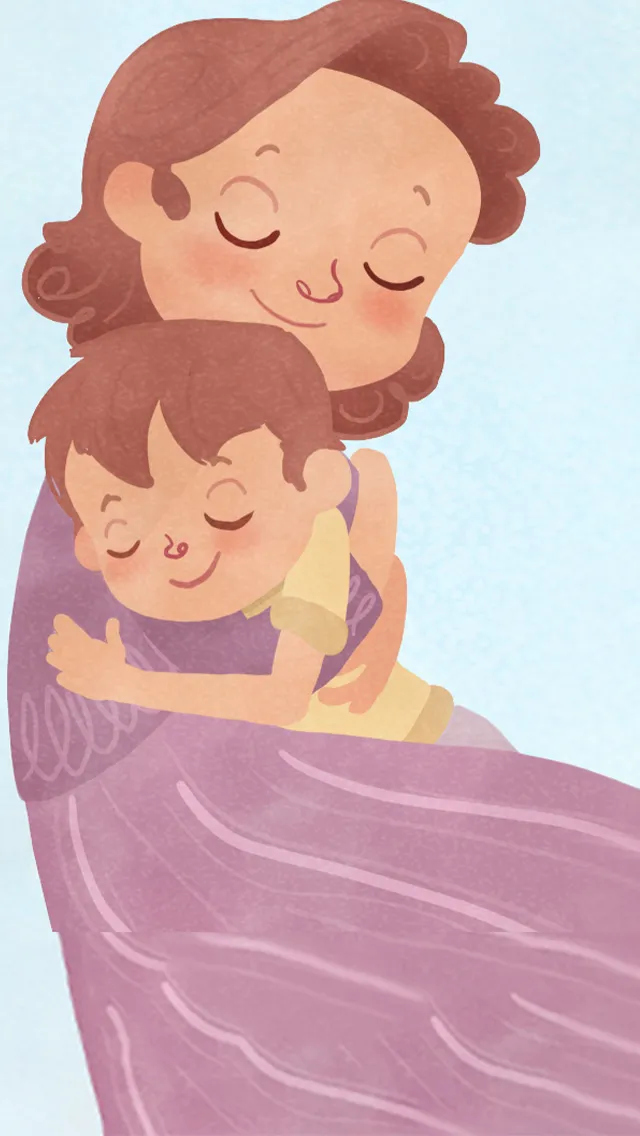As parents, we all want our kids to be kind and understand how others feel. Empathy is super important because it helps kids make friends and be nice to others.
Here are 20 easy and fun empathy activities for kids that you can easily fit into your daily routine. Try adding these into your daily routine and watch your child start to understand other people's feelings a bit better!
1. Listen affirmations on how to be empathetic
Listen affirmations that show different emotions is a simple way to teach empathy. Books with characters going through different feelings can help start conversations.
As you listen, ask your kid things like, "How do you think this character feels?" or "What would you do if you were them?" It’s a great way to get them thinking about other people’s feelings.
Teach your child the power of empathy with "You're Empathetic" in Storybook app, this story helps kids understand how to connect with others' feelings and build stronger relationships. Download it today! 📲⬇️
%25252011.03.45%2525E2%252580%2525AFp.m..webp)
2. Practicing perspective-taking
Help your kids practice seeing things from another person’s point of view.
Ask them questions like, "How do you think your friend feels after losing a game?" or "What could you do to help them feel better?"
This helps kids think beyond their own feelings and consider others’, which is a big part of empathy.
3. Discussing their emotions
Make it a habit to talk about emotions with your kids. Ask them open-ended questions like, "What made you happy today?" or "Did you notice if anyone was feeling sad?"
This helps kids build a vocabulary for their feelings and understand the emotional world around them better.
Try "Emma, You Can Be Anything." This empowering story shows that the sky's the limit when it comes to their future. Download now! ⬇️📲
%25252011.58.59%2525E2%252580%2525AFp.m..webp)
Pair this with some gratitude activities for kids to help them focus on positive emotions as well.
4. Creating an "empathy jar"
Create an empathy jar to encourage kind acts. Decorate a jar and call it the "Empathy Jar."
Every time your child does something nice, like sharing or comforting a friend, write it down on a slip of paper and add it to the jar.
Later, read through the notes together to see how these acts made others feel. It’s a fun way to show how small acts of kindness add up!
%25252011.34.03%2525E2%252580%2525AFa.m..webp)
5. Role-playing scenarios
Role-playing is a fun way for kids to act out different situations and learn how to respond with empathy.
They can pretend to be a friend who feels left out or a sibling who is upset. This kind of play helps kids see things from someone else’s perspective and practice being kind and understanding.
You can even find role-playing cards online to make it more fun!
%25252011.29.19%2525E2%252580%2525AFa.m..webp)
6. Empathy journaling
Encourage your kids to keep a journal where they write or draw about times they noticed someone else’s feelings or felt empathy.
This helps them reflect on their emotions and become more mindful.
Speaking of mindfulness, try incorporating some mindfulness activities for kids to further enhance their emotional awareness.
7. Volunteering as a family
Volunteering as a family is a great way to teach empathy through action. Help out at a food bank or clean up the neighborhood together.
These activities show kids how they can make a difference and help them connect with people from different backgrounds. This is also a great way to encourage grounding activities for kids.
8. Using "i feel" statements
Teach your kids to use "I feel" statements to express their emotions. Instead of saying, "You’re mean," they could say, "I feel sad when you don’t share with me."
This helps them express their feelings without blaming others and encourages empathy by understanding how their words and actions affect others.
You can also try respect activities for kids to help them learn to respect others' feelings.
9. Emotion charades
Emotion charades is a game where kids act out different emotions, and others guess what it is. It’s a fun way to help them recognize and understand feelings.
They also learn to notice things like facial expressions and body language. Make your own emotion cards with different feelings like happy, sad, or frustrated, or find some online.
It’s a great game to help kids tune into how others might be feeling.
10. Empathy mapping
Do a fun activity called empathy mapping. Draw a simple map with sections like "What do they feel?", "What do they think?", "What do they need?", and "How can I help?"
Pick a person or a story character and fill out the map together. It’s a fun way to get kids thinking about how others feel.
For older kids, consider anger management activities for teens to help them handle more complex emotions.
11. Compliment circle
A compliment circle is a fun way for kids to practice giving and receiving compliments.
Go around and take turns giving a sincere compliment to someone.
It’s great for building confidence and encouraging kindness.
You can combine this with kindness activities for kids to further boost their empathy skills.
12. Art projects expressing emotions
Let your kids express their feelings through art. Have them draw, paint, or create crafts that show different emotions.
This can help them understand their own feelings and those of others in a creative way.
Activities like these are also a fantastic opportunity for patience activities for kids as they learn to take their time to express themselves.
13. Walk in someone else’s shoes
In this activity, children sit in a circle and remove their shoes. Each child will put on the shoes of the person to their right.
The facilitator asks each child a series of questions, and they must respond as if they were the person whose shoes they are wearing. This game is ideal for symbolizing empathy and understanding others' emotions.
The benefit of this activity is that children learn to put themselves in others' shoes, helping them develop emotional intelligence and social skills.
14. What would you do?
In this game, children are divided into groups and presented with a challenging situation. Each group must discuss and decide what they would do in that situation. Then, the solutions are presented, and the reasons behind each decision are discussed.
The benefit of this activity is that children learn to think critically and consider different perspectives.
It also promotes collaboration and effective communication. Children develop problem-solving skills and learn to work in teams, which is essential for their emotional and social growth.
15. The web
In this activity, all the children sit in a circle and are given a ball of yarn. The facilitator takes the yarn and says one characteristic that defines them, then passes the yarn randomly to a peer.
At the end, a web is formed among all the children, symbolizing their connection.
The benefit of this activity is that children learn to get to know their peers and appreciate their differences. It also encourages collaboration and empathy.
16. Draw your friend
In this activity, each child draws their partner and describes their personality. Then, the drawings are exchanged, and each child must describe the partner they received.
The benefit of this activity is that children learn to observe and appreciate others.
It also encourages creativity and empathy.
17. Empathy Wheel
In this activity, children sit in a circle and are given a spinner. Each child spins the wheel and must share an emotion they would like to feel. Then, they discuss the reasons behind each choice.
The benefit of this activity is that children learn to recognize and express their emotions.
18. Guess the Emotion
In this activity, children pair up and are given a card with an emotion written on it. Each pair must guess which emotion is written on the card.
The benefit of this activity is that children learn to recognize and express others' emotions.
It also encourages communication and empathy, as children must closely observe their partner's expressions and behaviors to identify the correct emotion.
19. Feelings box
In this activity, children write down any unpleasant feelings they've experienced during the day and place them in a box. At the end of the day, each child picks a random note and suggests a solution to that problem.
The benefit of this activity is that children learn to recognize and manage their emotions. It also fosters empathy and collaboration.
20. Similarities and differences
In this activity, children pair up and are given a card with a characteristic of a person. Each pair must discuss the similarities and differences between that characteristic and their own experiences.
The benefit of this activity is that children learn to recognize and appreciate differences. It also promotes communication and empathy.
How to develop empathy in children?
Empathy is a crucial skill for the overall development of children. It is important for parents and educators to work together to encourage empathy in children through fun and educational activities.
Why is empathy important in children?
Empathy is essential for building healthy relationships and resolving conflicts peacefully. It is important for children to learn to value and understand the emotions of others.
Promoting empathy in children is key to their overall development. The activities mentioned in this article can help parents and educators effectively foster empathy in children. It’s important to create a home and school environment that values empathy and collaboration.
What are some signs that my child is developing empathy?
Look out for signs that your child is becoming more empathetic, like showing concern for others or using kind words. If they start pausing before reacting or saying things like, "I understand how you feel," you know these activities are working!
How do you teach empathy to kids through games?
Games are a great way to teach empathy because they’re fun and engaging. Activities like emotion charades or cooperative board games can help kids learn to think about how others feel and respond with kindness.
Helping kids learn empathy is one of the best things we can do for them.

By trying these 20 activities, you’re helping them grow into kind, understanding people. Remember, empathy is a skill that gets stronger with practice, and every little bit helps!

Written By
Entrepreneur mum. I created Storybook: Bedtime Stories the #1 app in over 90 countries. I have been able to help families with the app and through my social media influence. I also created a Facebook group with over 12,000 moms where we support each other.
References
- Williams-Sanchez, V. L. (2021). Reading builds empathy: Piloting a literacy tool to measure reading's impact on kids' empathy development (Publication No. 28316550) [Doctoral dissertation, St. John's University]. ProQuest Dissertations & Theses Global.
- Drew, N. (2018). No kidding about bullying: 126 ready-to-use activities to help kids manage anger, resolve conflicts, build empathy, and get along. Free Spirit Publishing.





.webp)
.webp)








